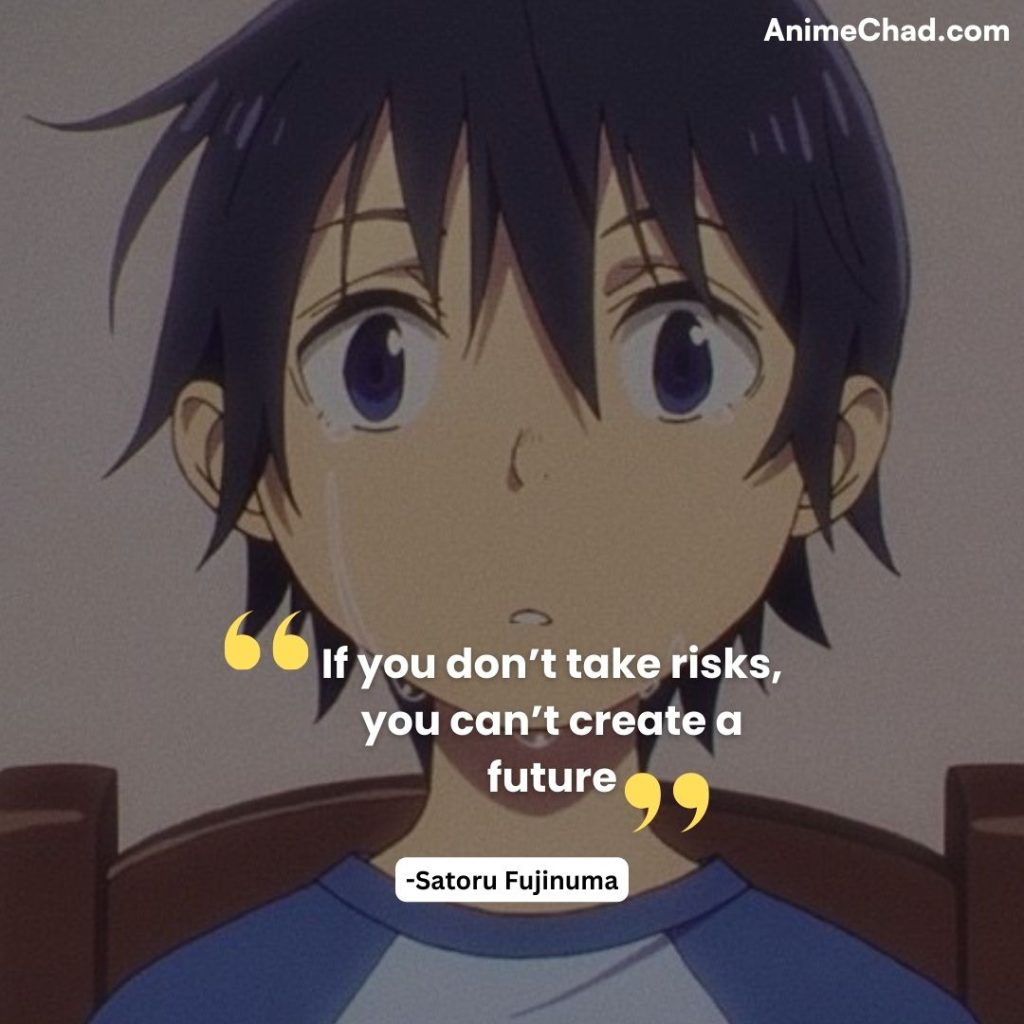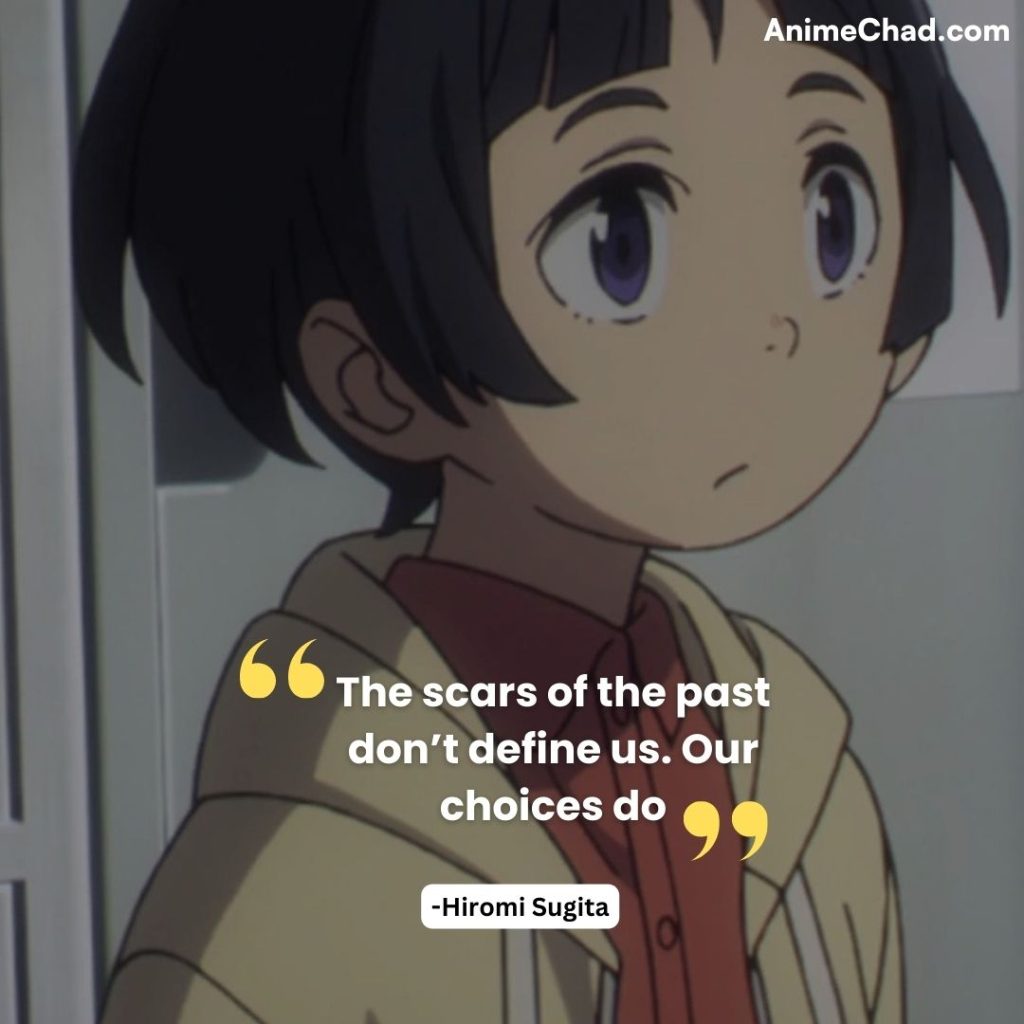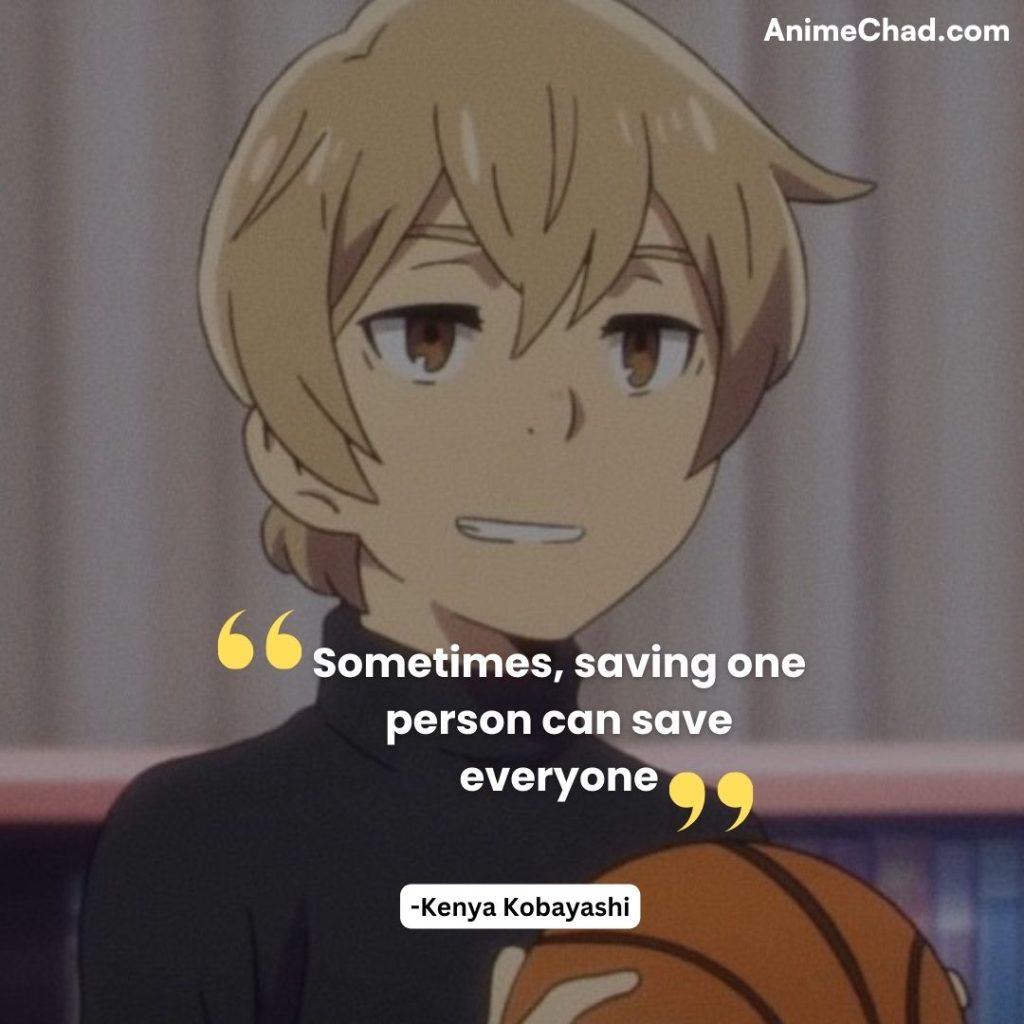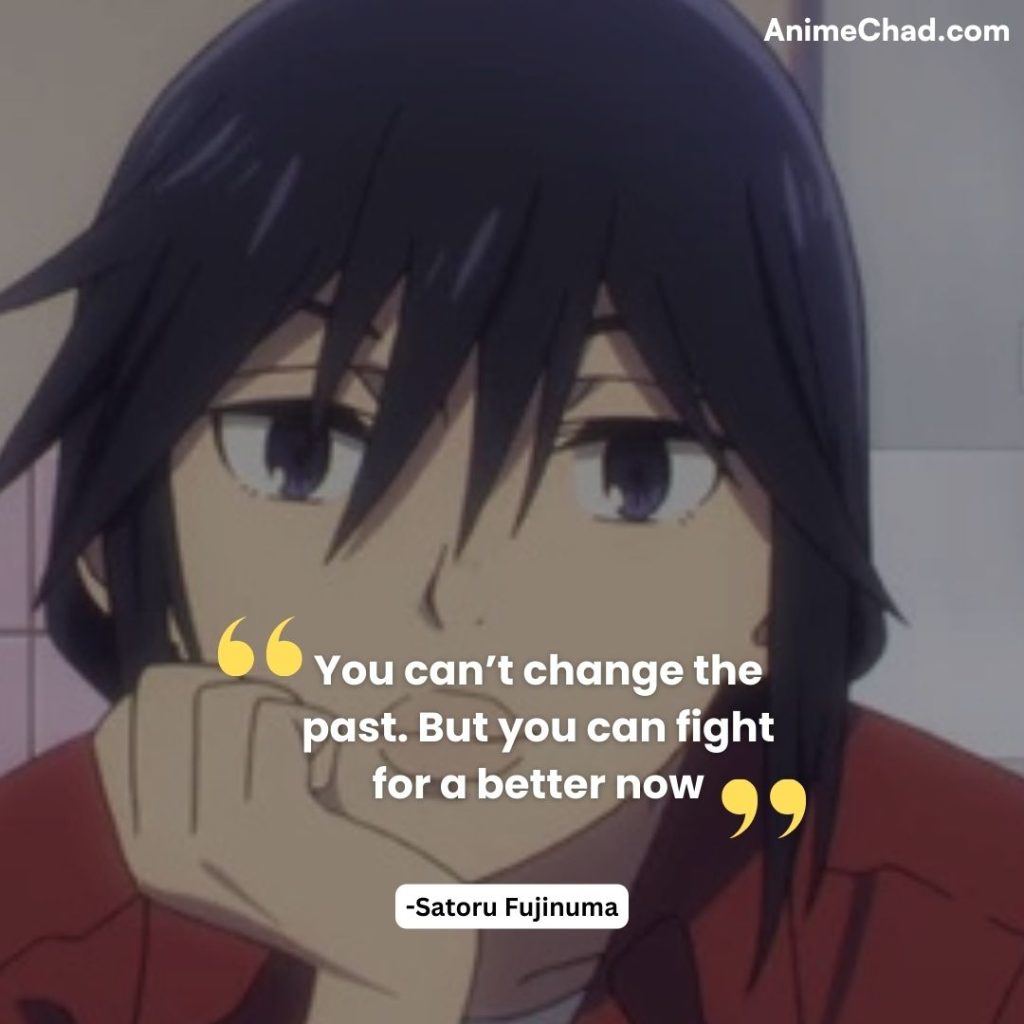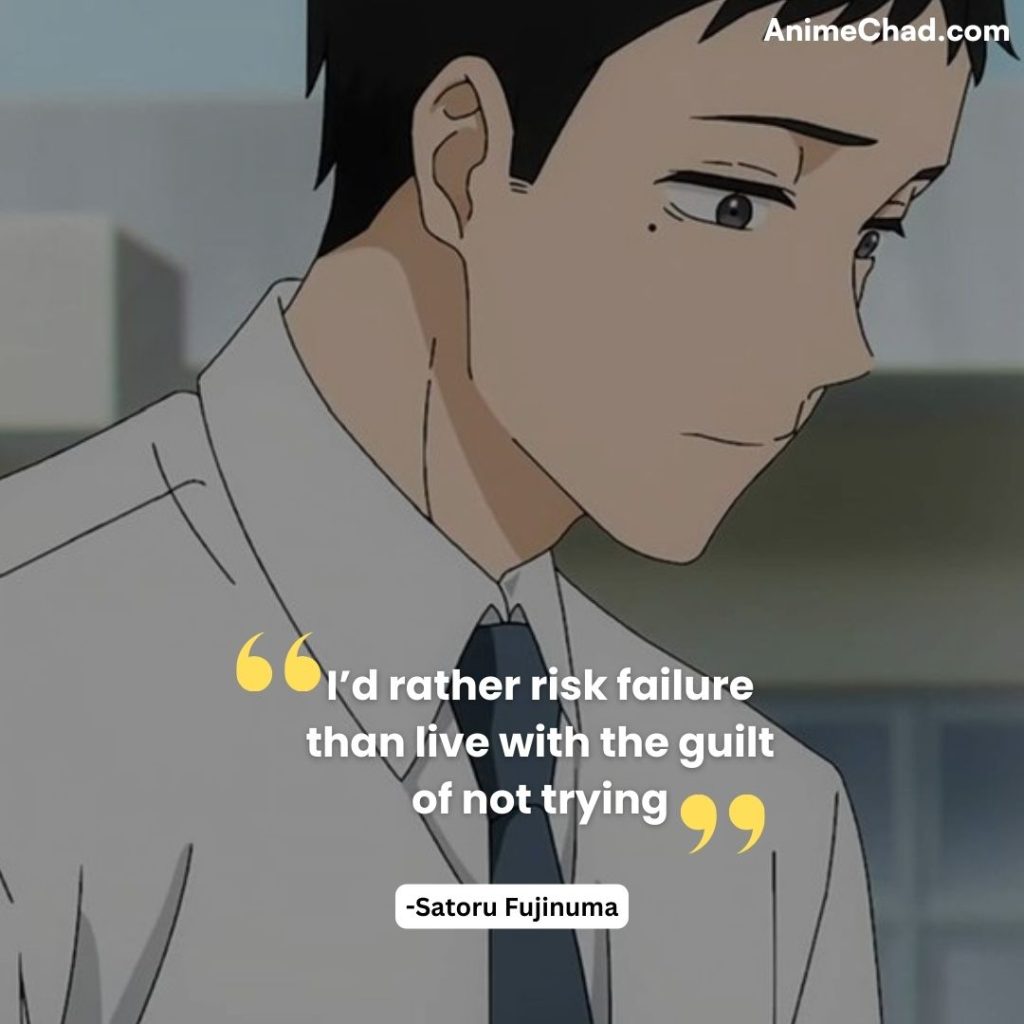Erased follows Satoru Fujinuma, a struggling manga artist with the ability to time-travel (“Revival”) to prevent tragedies, as he unravels a child abduction mystery tied to his past.
The series explores themes of redemption, the weight of choices, and the resilience of human connection.
This list curates quotes that capture its emotional depth and philosophical undertones.
The future is always blank. Only your will can leave footsteps there
Episode 11 (Proud Citizen)
Speaker: Satoru Fujinuma
Context: Satoru’s resolve to shape fate through action, rejecting passive acceptance of tragedy.
I don’t need a reason to save someone
Episode 4 (Pursuit)
Speaker: Satoru Fujinuma
Context: Defines Satoru’s moral core, prioritizing empathy over logic in his mission.
I want to protect her. I want to change the future
Episode 5 (Handprint)
Speaker: Satoru Fujinuma
Context: Satoru’s vow to save Kayo, symbolizing his rejection of helplessness.
I believe in you, Satoru
Episode 7 (Glimpse)
Speaker: Sachiko Fujinuma
Context: Sachiko’s unwavering faith in her son, anchoring his resolve.
I want to live in a world where I can be happy
Episode 6 (Abduction)
Speaker: Kayo Hinazuki
Context: Kayo’s plea for hope amid abuse, humanizing her trauma.
You can’t save someone just by feeling sorry for them
Episode 9 (Bond)
Speaker: Kenya Kobayashi
Context: Kenya’s challenge to Satoru, urging proactive compassion over pity.
If you don’t take risks, you can’t create a future
Episode 12 (Joy)
Speaker: Satoru Fujinuma
Context: Satoru’s acceptance of vulnerability as essential to change.
Adults can’t be relied on. We have to protect ourselves
Episode 3 (Revival)
Speaker: Kenya Kobayashi
Context: Reflects the children’s disillusionment with negligent authority figures.
You’re the one who taught me it’s okay to rely on others
Episode 10 (Happy)
Speaker: Kayo Hinazuki
Context: Kayo’s growth, crediting Satoru for restoring her trust in people.
Even if the world is cruel, kindness still exists
Light Novel (Vol. 3)
Speaker: Sachiko Fujinuma
Context: Sachiko’s enduring optimism, a counterpoint to the series’ darker themes.
Monsters don’t cry. But humans do
Episode 8 (Hope)
Speaker: Yashiro Gaku
Context: Yashiro’s chilling self-justification, contrasting his humanity with his crimes.
I won’t let anyone die. Not this time
Episode 2 (Awakening)
Speaker: Satoru Fujinuma
Context: Satoru’s oath after Revival, marking his shift from passive to heroic.
Running away is easy. Facing the past is where courage lies
Episode 7 (Glimpse)
Speaker: Airi Katagiri
Context: Airi’s indirect advice to Satoru, emphasizing accountability.
You’re not alone anymore
Episode 6 (Abduction)
Speaker: Satoru Fujinuma
Context: Satoru’s promise to Kayo, offering her first sense of belonging.
The scars of the past don’t define us. Our choices do
Manga (Ch. 35)
Speaker: Hiromi Sugita
Context: Hiromi’s maturation, rejecting victimhood after surviving abduction.
Sometimes, saving one person can save everyone
Episode 12 (Joy)
Speaker: Kenya Kobayashi
Context: Kenya’s insight into the ripple effect of Satoru’s actions.
I wanted to create a world without ugliness. But I became the ugliness itself
Episode 11 (Proud Citizen)
Speaker: Yashiro Gaku
Context: Yashiro’s tragic self-awareness, revealing his warped idealism.
Even if you forget, the heart remembers
Episode 10 (Happy)
Speaker: Kayo Hinazuki
Context: Kayo’s letter to Satoru, affirming love’s enduring impact.
Heroes aren’t born. They’re made by the people who believe in them
Episode 5 (Handprint)
Speaker: Kenya Kobayashi
Context: Kenya’s role in shaping Satoru’s heroic identity.
The coldest winters are the ones spent without hope
Manga (Ch. 22)
Speaker: Kayo Hinazuki
Context: Kayo’s metaphor for her pre-Satoru despair.
You can’t change the past. But you can fight for a better now
Episode 9 (Bond)
Speaker: Satoru Fujinuma
Context: Satoru’s pragmatic philosophy, focusing on present action over regret.
Love is wanting someone to live, even if it means letting them go
Episode 12 (Joy)
Speaker: Sachiko Fujinuma
Context: Sachiko’s sacrifice, allowing Satoru to confront Yashiro.
Evil wins when good people do nothing
Episode 4 (Pursuit)
Speaker: Satoru Fujinuma
Context: Satoru’s rebuke of bystander culture, justifying his interventions.
I’d rather risk failure than live with the guilt of not trying
Light Novel (Vol. 2)
Speaker: Satoru Fujinuma
Context: Satoru’s defiance against fatalism, central to his character arc.
Thank you for giving me a tomorrow
Episode 12 (Joy)
Speaker: Kayo Hinazuki
Context: Kayo’s tearful gratitude to Satoru, encapsulating the series’ emotional climax.








